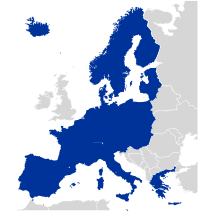
The Council of the European Union, often referred to in the treaties and other official documents simply as the Council, and informally known as the Council of Ministers, is the third of the seven Institutions of the European Union (EU) as listed in the Treaty on European Union. It is one of three legislative bodies and together with the European Parliament serves to amend and approve or veto the proposals of the European Commission, which holds legislative initiative.

The European Economic Community (EEC) was a regional organization that aimed to bring about economic integration among its member states. It was created by the Treaty of Rome of 1957. Upon the formation of the European Union in 1993, the EEC was incorporated into the EU and renamed the European Community (EC). In 2009, the EC formally ceased to exist and its institutions were directly absorbed by the EU. This made the Union the formal successor institution of the Community.

The Flemish Parliament constitutes the legislative power in Flanders for matters which fall within the competence of Flanders, both as a geographic region and as a cultural community of Belgium.

The Common Fisheries Policy (CFP) is the fisheries policy of the European Union (EU). It sets quotas for which member states are allowed to catch each type of fish, as well as encouraging the fishing industry by various market interventions. In 2004 it had a budget of €931 million, approximately 0.75% of the EU budget.

COREPER, from French Comité des représentants permanents, is the Committee of Permanent Representatives in the European Union, made up of the head or deputy head of mission from the EU member states in Brussels.

The politics of the European Union are different from most other polities and states due to the unique nature of the European Union. The EU is similar to a confederation, where many policy areas are federalised into common institutions capable of making law; the competences to control foreign policy, defence policy or the majority of direct taxation policies are mostly reserved for the twenty-seven state governments. These areas are primarily under the control of the EU's member states although a certain amount of structured co-operation and coordination takes place in these areas. For the EU to take substantial actions in these areas, all Member States must give their consent. Union laws that override State laws are more numerous than in historical confederations; however the EU is legally restricted from making law outside its remit or where it is no more appropriate to do so at a state or local level (subsidiarity) when acting outside its exclusive competences. The principle of subsidiarity does not apply to areas of exclusive competence.

The European Structural and Investment Funds are financial tools set up to implement the regional policy of the European Union, the Common Agricultural Policy and the Common Fisheries Policy, governed by a common rulebook. They aim to reduce regional disparities in income, wealth and opportunities. Europe's poorer regions receive most of the support, but all European regions are eligible for funding under the policy's various funds and programmes. The current Regional Policy framework is set for a period of seven years, from 2021 to 2027.
The Committee on Agriculture and Rural Development (AGRI) is a committee of the European Parliament.
The Committee on Fisheries (PECH) is a committee of the European Parliament.

The Directorate-General for Agriculture and Rural Development is a Directorate-General of the European Commission. The DG AGRI is responsible for the European Union policy area of agriculture and rural development. The work of the DG AGRI is closely linked with the Common Agricultural Policy (CAP).

The Directorate-General for Maritime Affairs and Fisheries is a Directorate-General of the European Commission, responsible for the policy area of fisheries, the Law of the Sea and Maritime Affairs of the European Union. The current director-general is Charlina Vitcheva.

The European Fisheries Control Agency (EFCA) is the agency of the European Union (EU) that co-ordinates the national operational activities in the area of fisheries, and assists the member states in their application of the Common Fisheries Policy (CFP). The agency is based in Vigo, Spain.
The Commissioner for Environment, Oceans and Fisheries is a member of the European Commission. The current Commissioner is Virginijus Sinkevičius, who also serves as EU Commissioner for the Environment.

The Commissioner for Agriculture is a member of the European Commission. The post is currently held by Commissioner Janusz Wojciechowski. The post is in charge of rural issues including most notably the controversial Common Agricultural Policy (CAP) which represents 44% of the EU budget. They also participate in meetings of the Agriculture and Fisheries Council (Agrifish) configuration of the Council of the European Union.
European Union (EU) concepts, acronyms, and jargon are a terminology set that has developed as a form of shorthand, to quickly express a (formal) EU process, an (informal) institutional working practice, or an EU body, function or decision, and which is commonly understood among EU officials or external people who regularly deal with EU institutions.
The Special Committee on Agriculture (SCA) is an administrative body of the European Union that prepares the work and tasks of the Agriculture and Fisheries Council concerning agriculture, similar to the role of the Committee of Permanent Representatives (COREPER) for other Council configurations.

The Juncker Commission was the European Commission in office from 1 November 2014 to 30 November 2019. Its president was Jean-Claude Juncker, who presided over 27 other commissioners. In July 2014, Juncker was officially elected to succeed José Manuel Barroso, who completed his second five-year term in that year.

The Justice and Home Affairs Council (JHA) is one of the configurations of the Council of the European Union and is composed of the justice and home affairs ministers of the 27 European Union member states.

The Directorate-General for Agriculture, Fisheries, Social Affairs and Health is a directorate-general of the Council of the European Union that prepares the work and tasks of the Agriculture and Fisheries Council.











